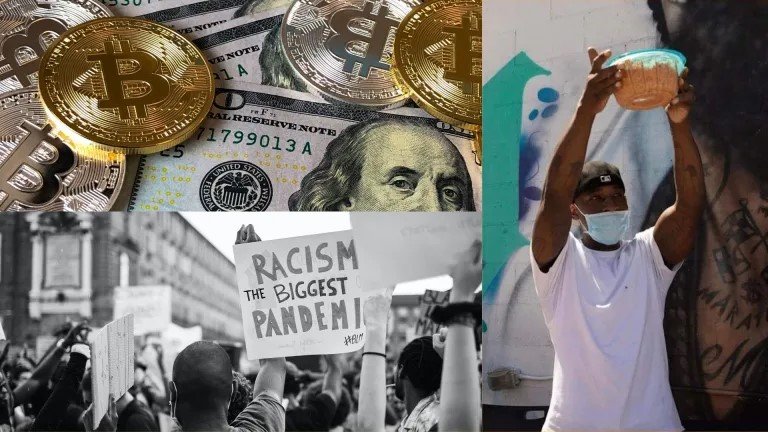How Reparations Could Relieve Medical Debt for Black Folks
Illustration by Anissa Durham. Photo by Adriana Heldiz. Photo courtesy of marco allasio/Pexels and David McBee/Pexels.
California’s reparations package proposes $1.2 million in payments to eligible Black residents. Here’s how that money could change lives.
This story is part of Word In Black’s “Reparations Now” series exploring the fight for our modern-day 40 acres and a mule and why Black Americans deserve justice.
By Anissa Durham
I struggled to write this. How do I encapsulate, in a concise way, the atrocities of slavery, segregation, and violence against Black bodies?
As a writer, I didn’t know where to begin. I didn’t know how much to explain about the gravity of our humanity, the lives that have been stolen and extinguished.
To think Black lives don’t deserve reparations is to say Black people deserve death. It’s to say our lives are worthless. It’s to say the violence incurred on the generations that have preceded you and I meant nothing.
Many Black people — like me — avoid reading about slavery, segregation, lynching, and police brutality — because, oftentimes, it’s too much. It’s too much to bear. It’s too much to hear about. And yet, I have experienced so little in comparison to my ancestors.
So, for them, I write this story. For those in my community who are living at the same time as me, regardless of age, I write this.
Reparations are truly the bare minimum of what our community deserves.
Reparations will never bring back the lives of those who were brutally beaten to death in the fields. It will never heal the women who were raped by slave owners. It will never resurrect those who were stripped of their humanity and genitals through lynching. It will never comfort the gaping hole that lives in the surviving hearts of families whose loved ones died of police brutality.
But maybe — just maybe — it will offer those of us who are living and will live an opportunity for a life of ease. A life without the constant threat of death and suffering. And an opportunity to live a healthier and more fruitful life in a country most of us call home.
The Horrific Reality of Losing Health Insurance
At the time of our interview, it had been more than three weeks since Aziza Primous Harris took her last endometriosis pill. As she transitions from one job to another, she does not have health insurance. Which means she can’t afford to pay $2,000 out of pocket for a 28-day supply of her medication.
It will likely be a couple more weeks before she has health insurance again. So, she has been left to ration a one-week supply of pills by taking one every other day. “I just have to be uncomfortable for the next few weeks,” she says.
The U.S. Census Bureau reported in 2021 that Hispanic and Black Americans had the highest percentage of working-age adults without health insurance.
California governor Gavin Newsom formed the California Reparations Task Force in 2020 — and in June 2022, the task force produced an interim report that proposed up to $1.2 million in reparations for eligible Black Americans. Primous Harris, a California resident, says if she got $1.2 million, she wouldn’t have to worry about affording her medication.
On Thanksgiving Day in 2007, she had abdominal pain. More than two weeks went by before doctors told her she was having her second miscarriage. She had an emergency D and C to remove the dead fetus.
“I thought I was dying,” Primous Harris says.
Later, she was diagnosed with endometriosis in 2013, and now at 43, she’s spent years trying different pain-relieving methods. After giving birth to her second child, she also suffered a uterine prolapse. With no desire or ability to be on medication for the rest of her life, she wants to get a hysterectomy.
Courtesy of Aziza Primous Harris.
“I had to advocate for myself for three years. Because women are not in charge of our own bodies in America,” she says. “And there’s a lot of biases around women of color, around our pain, and our levels of pain and the validity of our pain.”
The financial burden of dealing with medical issues has made it difficult for Primous Harris to keep up with alternative pain-relieving methods — like massages, chiropractic care, and homeopathic medicines. And as a wife, mother, and instructional aide for special education, her household, like many in America, is persistently working to make ends meet.
“I was born in this country, and I can’t partake in the American dream because of all of the systemic policies that are latent and obvious,” she says. In education, “we don’t get paid squat. We’re not paid what we’re worth.”
Primous Harris says her husband is the primary breadwinner in their home. If he were to get sick and become unable to work, only a few months would pass before their savings are depleted. They would be at risk of being homeless.
Related: Most Americans Are One Crisis Away From Becoming Unhoused
“$1.2 million opens up access to everything,” Primous Harris says. “It would be a different kind of launchpad that Black people specifically don’t have access to currently.”
Slavery: The Foundation of Medical Racism
In the nearly 500-page interim report filed by the California task force, more than 30 pages detail how slavery and violence against Black bodies are the foundation of healthcare. At the outset, the report details how federal, state, and local governments subjected enslaved people to dehumanizing conditions, policies, and practices.
Some of the demoralizing practices enforced against Black bodies included researchers trying to prove Black people were biologically suited to slavery, the invention of mental health diseases for enslaved people who had the “irrational desire to run away,” and the false belief that Black people have a higher pain threshold than white people.
Jasmine Young, a policy analyst with the National Health Law Program, says policy reform needs to continue to help address the health disparities that exist in the Black community. At NHeLP, she works with Medi-Cal, California’s Medicaid health coverage program, to ensure the programs and services are reaching the health needs of Californians.
Courtesy of Jasmine Young.
In California, thousands of mental health patients were forcibly sterilized due to the eugenicist efforts of the Human Betterment Foundation, which played a key role in the popularity of the eugenics movement that spanned the first half of the 19th century. More than 20,000 people are recorded to have been sterilized in California due to these laws.
As a form of reparations, the Forced or Involuntary Sterilization Compensation program has a total of $4.5 million set aside to pay survivors, with payment totals depending on the number of eligible applicants.
“I commend California for taking the step to compensate those who have been impacted, but it does take a structural change to ensure that doesn’t happen again,” Young says. “I think it starts with addressing our healthcare providers and the type of people that we train to take care of Black patients.”
Although many of the laws and policies that allowed these atrocities are no longer in effect, the devasting impact of medical racism and mistrust still stands today.
When asked what policies need to be changed or put in place to make the health care system more accessible for Black folks in California, Young says getting rid of the Medicaid estate recovery, which currently seeks repayment from certain estates of deceased Medi-Cal recipients.
“Trying to eliminate that role would address some of the wealth inequities that exist with Black people when it comes to accessing healthcare,” she says.
In a 2019 Kaiser Family Foundation analysis, Black Americans are more likely than any other racial or ethnic group to report significant medical debt.
The proposed reparations are more than just monetary compensation. Young says it is an expansion of different policy reforms that remedy the trauma Black folks have experienced. “We have constantly been harmed within society.”
But it’s going to take more than compensation to create systemic change in the healthcare system and policy. In part, reforming the medical education system by addressing the curriculum taught to healthcare providers is needed.
“It’s important when confronting racial prejudices and biases that our healthcare providers are aware of these biases that exist within them,” Young says, “and actively preventing it from influencing the type of care they provide to Black patients.”
Money Isn’t Enough
Michael Whyte is an organizer for Pillars of the Community, a faith-based organization focused on helping people impacted by the criminal justice system in San Diego. He says getting reparations is a dream — but he isn’t convinced it will create concrete change.
Photo courtesy of Michael Whyte.
“I don’t think money is enough,” Whyte says. “They’re not only supposed to give monetary gain but they’re supposed to stop the oppression that caused them to give reparations. I think America is ready to give us some money, but I don’t think they’re ready to stop criminalizing us, over-policing us, and terrorizing our communities.”
In San Diego, a Justice Navigator report found that, from 2016-2020, Black folks had the third-highest number of traffic stops in the city. This over-policing also led to higher rates of equipment stops and license and registration stops than non-Black folks.
When it comes to accessing the healthcare system, Whyte is hopeful with reparations, Black folks can get better health insurance coverage. “Medi-Cal gives you the bare minimum of everything. They always treat us as second-class citizens.”
In a survey of 3,325 Black California residents, women with Medi-Cal reported higher rates of negative experiences during healthcare visits. Some of the top complaints include their symptoms not being taken seriously and providers not believing they were telling the truth.
“My mom used to always tell me the only two people she’s afraid of are police officers and doctors because both of them can kill you and get away with it,” he says. “Black people have a history of going to the hospital for a knee problem and coming out dead.”
For Whyte, $1.2 million in reparations would be life-changing. But he says he wants to buy land and invest the money to build generational wealth, something most Black families have yet to experience. He hopes Black folks will take the same approach and not squander it — and says there needs to be more financial literacy that comes with how to use the money.
“We deserve reparations.”




